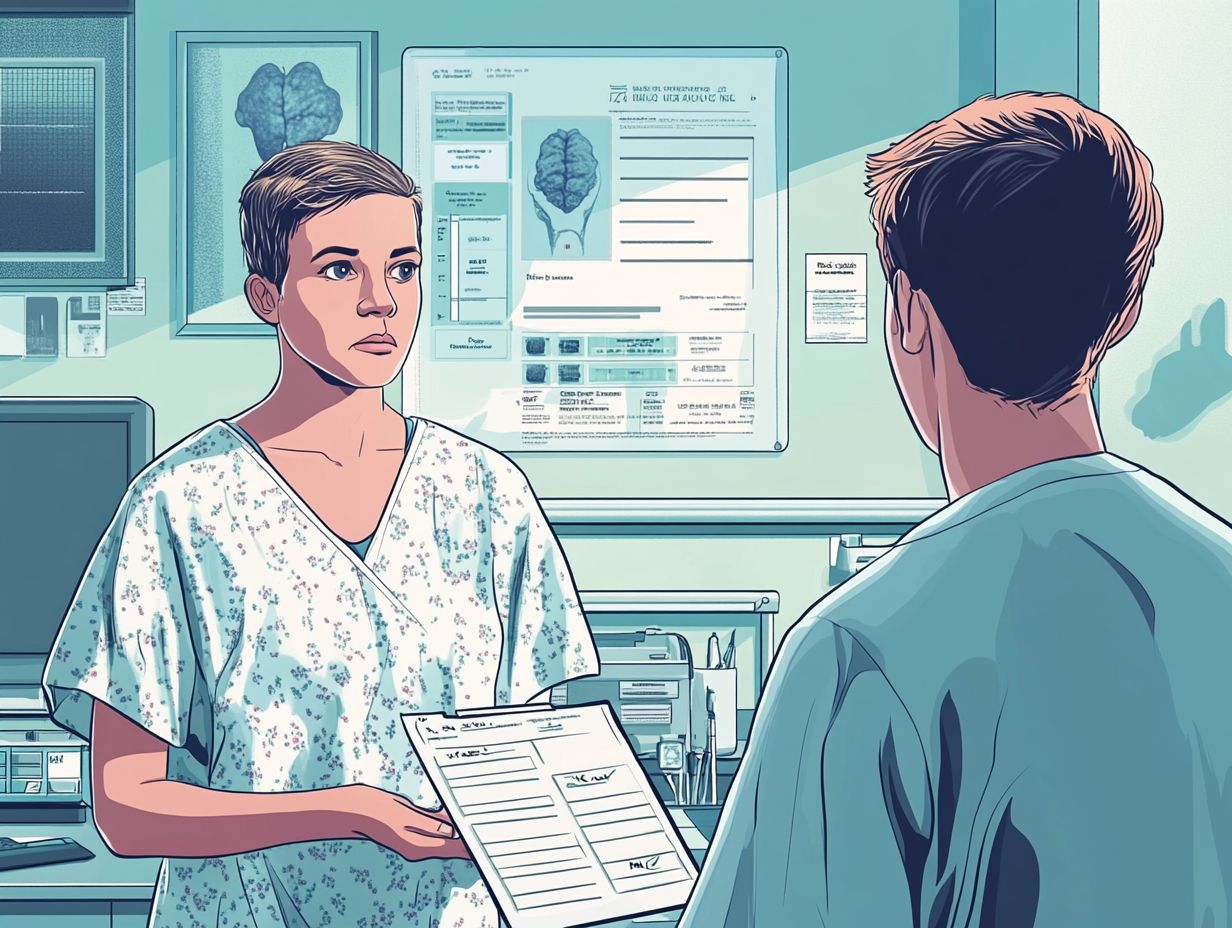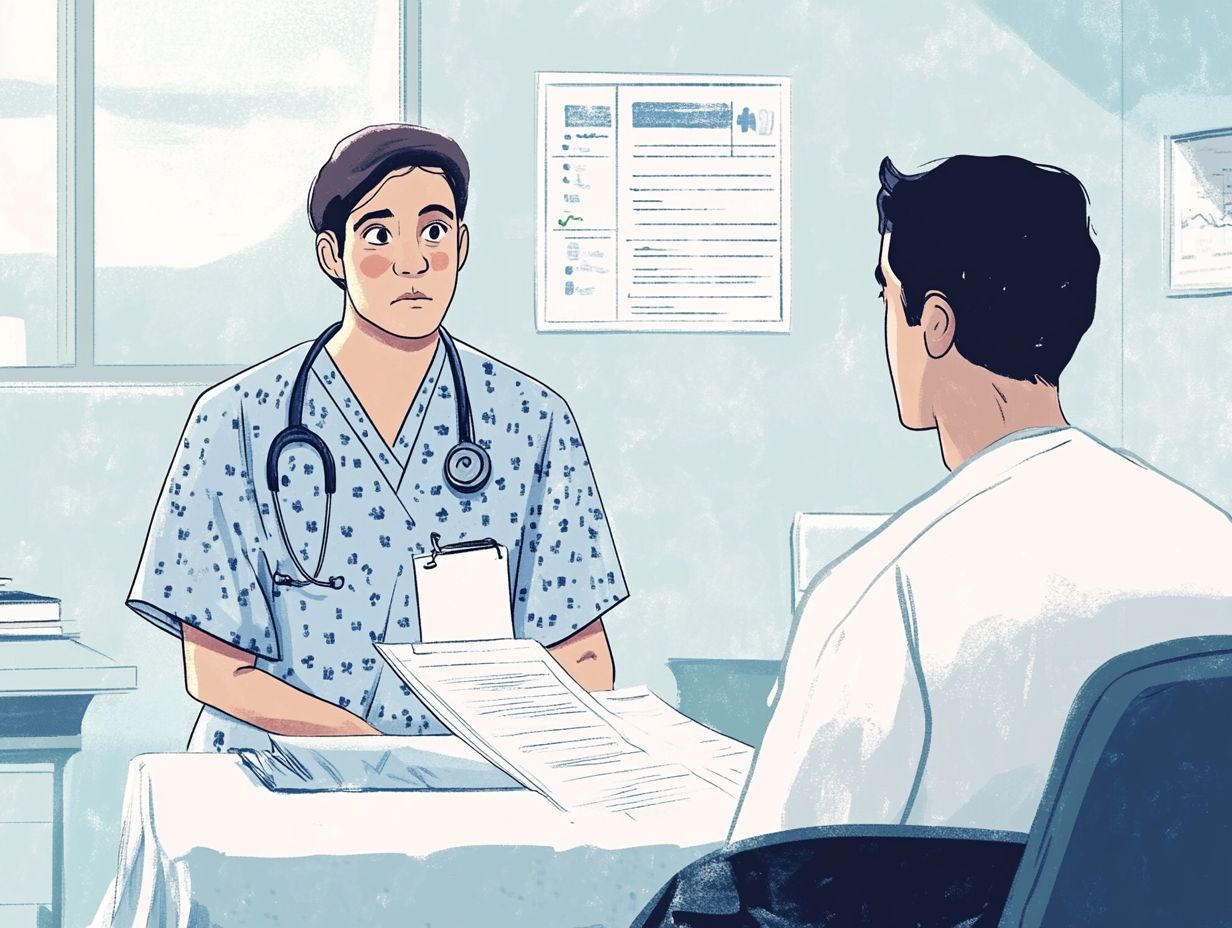During cancer treatment, it is crucial to be vigilant about potential red flags that may indicate complications or the need for adjustments in care. Recognizing these warning signs can help ensure timely medical intervention and improve overall treatment outcomes, especially in cases involving brain tumors or spinal metastases.
Here are five key red flags to watch for:
- Sudden Weight Loss or Gain: Significant changes in weight can signal health issues related to chemotherapy or treatment complications, including loss of appetite and potential malnutrition. It is essential to monitor weight and consult healthcare professionals for proper management through nutrition and meal planning to prevent anaemia.
- Unexplained Fatigue or Weakness: Common among cancer patients, this side effect can result from reduced red blood cell production, also known as anaemia. Strategies to cope include a balanced diet, light physical activity, and regular sleep patterns, all under the guidance of healthcare providers, to manage tiredness effectively.
- Persistent Pain or Discomfort: Persistent pain may indicate serious issues like metastases or treatment side effects, including spinal metastases. Immediate medical attention is necessary for effective pain management and to enhance the patient’s quality of life.
- Changes in Bowel or Bladder Habits: Such changes, including diarrhoea or constipation, can result from chemotherapy and may indicate deeper health issues. Effective management requires open communication with healthcare providers, a balanced diet, and staying hydrated.
- Abnormal Bleeding or Bruising: Often caused by decreased platelet production due to chemotherapy or blood disorders like Hematological tumors, abnormal bleeding or bruising requires immediate medical evaluation to rule out complications and ensure patient safety.
Understanding and addressing these red flags proactively can significantly contribute to effective cancer treatment and improve patient well-being. Early detection and timely intervention are crucial. For more detailed information on managing these and other aspects of cancer treatment, consult your healthcare provider.
Key Takeaways:
1. Sudden Weight Loss or Gain

Sudden weight loss or gain during cancer treatment can indicate underlying health issues or complications related to chemotherapy.
Weight changes can result from appetite changes, nausea, or emotional stress.
Monitoring weight is important for evaluating health status and treatment effectiveness.
Consulting healthcare professionals can help manage weight changes through meal planning and nutrition.
2. Unexplained Fatigue or Weakness
Unexplained fatigue or weakness is a common side effect for cancer patients undergoing chemotherapy, often exacerbated by anaemia symptoms.
Chemotherapy causes fatigue by reducing the production of red blood cells, leading to anaemia and decreased energy levels, which are common side effects.
Coping strategies to address fatigue and manage tiredness include:
- A balanced diet rich in iron
- Light physical activity
- Regular sleep patterns
Communication with healthcare providers is crucial for managing fatigue effectively.
3. Persistent Pain or Discomfort
Persistent pain or discomfort in cancer patients may indicate issues like spinal metastases or treatment complications, requiring immediate medical attention for effective management, especially in cases involving neurological symptoms or deficits.
This pain can be localized, neuropathic, or visceral, affecting quality of life and potentially leading to anxiety and depression.
Timely medical evaluation and pain management from specialists are crucial for personalized pain relief strategies, enhancing patient well-being and addressing potential complications early.
4. Changes in Bowel or Bladder Habits
Changes in bowel or bladder habits in cancer patients often result from treatments like chemotherapy, causing symptoms such as diarrhea or constipation, which require careful management and timely medical advice.
Changes in bowel or bladder habits can indicate deeper health issues requiring medical attention.
Maintaining open communication with healthcare providers helps manage these changes effectively.
Maintaining a balanced diet and staying hydrated are essential strategies for managing changes in bowel or bladder habits and reducing the risk of associated complications.
5. Abnormal Bleeding or Bruising

Abnormal bleeding or bruising can occur during cancer treatments like chemotherapy due to decreased platelet production or impaired clotting, often necessitating urgent medical advice.
Such bleeding or bruising results from reduced ability to form clots, often caused by chemotherapy or medications affecting clotting factors, and can be exacerbated by infections.
Immediate medical evaluation is necessary to rule out complications and ensure safety.
What Are the Common Symptoms of Cancer?
Common symptoms of cancer include:
- unexplained weight loss
- persistent fatigue
- pain
- changes in appetite or bowel habits
- unusual bleeding
Symptoms can vary based on cancer type and location.
What Are the Different Types of Cancer Treatment?
Different types of cancer treatment include chemotherapy, targeted therapy, immunotherapy, and radiation therapy.
- Chemotherapy uses drugs to kill cancer cells.
- Targeted therapy attacks specific molecules involved in tumor growth.
- Immunotherapy boosts the immune system to fight cancer.
- Radiation therapy uses high-energy rays to destroy cancer cells.
The choice of cancer treatment depends on cancer type and stage.
How Can One Manage Side Effects of Cancer Treatment?
Managing side effects of cancer treatment involves using anti-nausea medications (antiemetics), dietary changes, and strategies to cope with hair loss, such as reducing hair loss through cooling caps.
Regular physical activity and relaxation techniques help alleviate fatigue and enhance well-being, while also addressing emotional issues and sleep problems.
Open communication with healthcare providers allows for personalized side effect management strategies, including complementary therapies like acupuncture and yoga, to improve emotional well-being and address cognitive functions.
A tailored plan improves comfort and quality of life during cancer treatment.
What Are the Warning Signs of a Complication During Cancer Treatment?

Warning signs of complications during cancer treatment include multiple red flags such as:
- unusual bleeding
- severe pain
- neurological symptoms (confusion, difficulty walking, numbness)
- signs of infection (fever, chills, increased pain)
Severe fatigue impacting daily activities is another critical warning sign, indicating the need for urgent medical evaluation.
How Can a Patient Advocate for Themselves During Cancer Treatment?
Patient advocacy during cancer treatment involves actively communicating with healthcare providers, understanding treatment options, and asserting personal needs.
Patients can advocate for themselves by:
- Asking questions about diagnoses and treatments
- Discussing potential side effects
- Documenting symptoms to ensure effective communication with medical teams
Using support groups and patient advocates can enhance understanding and provide additional support resources.
What Are the Long-Term Effects of Cancer Treatment?
Long-term effects of cancer treatment include memory problems, emotional issues, changes in cognitive functions, and concentration issues.
Cancer treatment can cause persistent physical symptoms like fatigue, pain, and changes in bodily function, affecting daily activities.
Cancer survivors often experience anxiety and depression, needing comprehensive care and regular follow-ups with healthcare professionals.
Frequently Asked Questions
What are the 5 red flags to watch out for during cancer treatment?

The 5 red flags to watch out for during cancer treatment are: persistent pain, unexplained weight loss, extreme fatigue, abnormal lab results, and changes in bowel or bladder habits. These symptoms could indicate a potential complication or side effect of treatment.
How can persistent pain during cancer treatment be a red flag?
Persistent pain during cancer treatment can be a red flag because it could indicate that the treatment is not effectively controlling the cancer, or it could be a sign of an infection or other complication, such as spinal metastases. It is important to communicate any pain to your healthcare team so they can address it appropriately.
Why is unexplained weight loss a red flag during cancer treatment?
Unexplained weight loss can be a red flag during cancer treatment because it could be a sign of malnutrition or a decrease in muscle mass. This can weaken the body and make it harder to tolerate treatment. It is important to discuss any significant weight changes with your doctor.
What should I do if I experience extreme fatigue during cancer treatment?
If you experience extreme fatigue during cancer treatment, it is important to communicate this to your healthcare team. They may be able to provide strategies to help manage your fatigue and improve your energy levels, potentially involving interventions to prevent anaemia. Extreme fatigue can also be a sign of anemia or other complications, so it is important to address it promptly.
How can abnormal lab results be a red flag during cancer treatment?
Abnormal lab results can be a red flag during cancer treatment because they could indicate a potential complication or side effect of treatment. It is important to regularly monitor your lab results and discuss any significant changes with your healthcare team to ensure timely intervention.
Why are changes in bowel or bladder habits concerning during cancer treatment?
Changes in bowel or bladder habits, such as diarrhoea or constipation, can be concerning during cancer treatment because they could indicate a potential issue with the digestive or urinary system. These changes could also be a side effect of certain treatments like chemotherapy, which may cause other symptoms such as feeling sick, temporary hair loss, sore mouth, or mucositis. It is important to communicate any changes to your healthcare team so they can address them appropriately and help reduce infection risk. Consider consulting resources like Macmillan Cancer Support for more information on managing side effects and patient outcomes.





